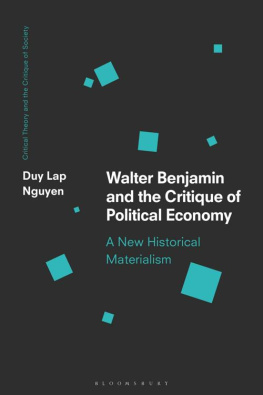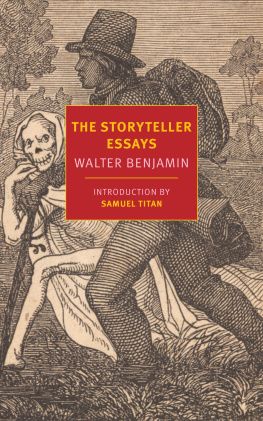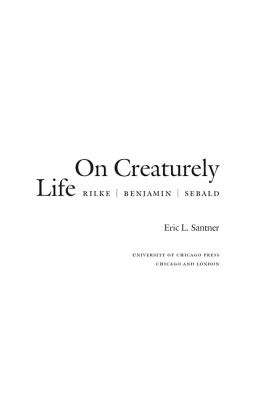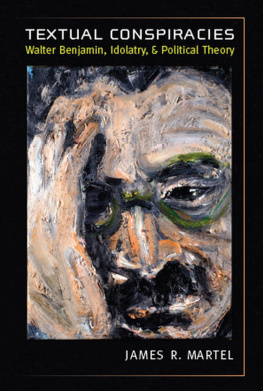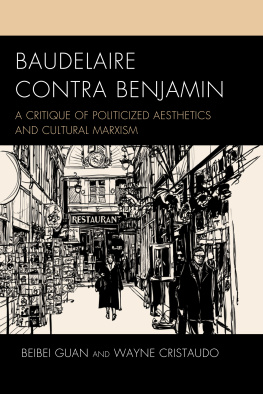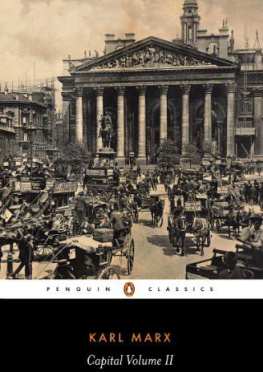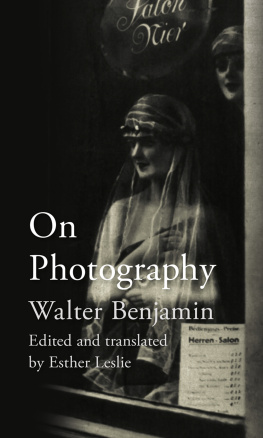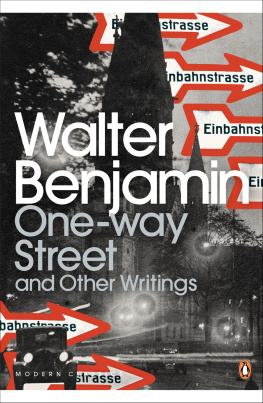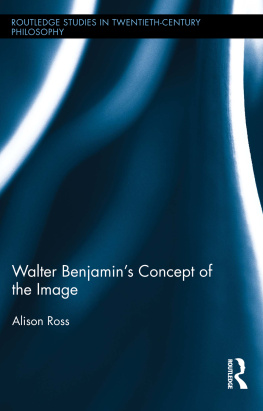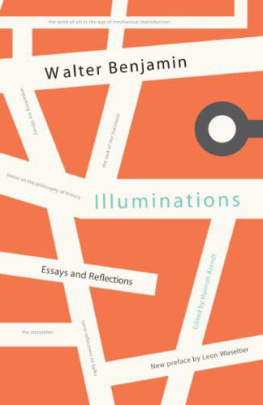Duy Lap Nguyen - Walter Benjamin and the Critique of Political Economy
Here you can read online Duy Lap Nguyen - Walter Benjamin and the Critique of Political Economy full text of the book (entire story) in english for free. Download pdf and epub, get meaning, cover and reviews about this ebook. year: 2022, publisher: Bloomsbury Publishing, genre: Religion. Description of the work, (preface) as well as reviews are available. Best literature library LitArk.com created for fans of good reading and offers a wide selection of genres:
Romance novel
Science fiction
Adventure
Detective
Science
History
Home and family
Prose
Art
Politics
Computer
Non-fiction
Religion
Business
Children
Humor
Choose a favorite category and find really read worthwhile books. Enjoy immersion in the world of imagination, feel the emotions of the characters or learn something new for yourself, make an fascinating discovery.
- Book:Walter Benjamin and the Critique of Political Economy
- Author:
- Publisher:Bloomsbury Publishing
- Genre:
- Year:2022
- Rating:3 / 5
- Favourites:Add to favourites
- Your mark:
- 60
- 1
- 2
- 3
- 4
- 5
Walter Benjamin and the Critique of Political Economy: summary, description and annotation
We offer to read an annotation, description, summary or preface (depends on what the author of the book "Walter Benjamin and the Critique of Political Economy" wrote himself). If you haven't found the necessary information about the book — write in the comments, we will try to find it.
Walter Benjamin and the Critique of Political Economy — read online for free the complete book (whole text) full work
Below is the text of the book, divided by pages. System saving the place of the last page read, allows you to conveniently read the book "Walter Benjamin and the Critique of Political Economy" online for free, without having to search again every time where you left off. Put a bookmark, and you can go to the page where you finished reading at any time.
Font size:
Interval:
Bookmark:
Walter Benjamin and the Critique of Political Economy
Critical Theory and the Critique of Society Series
In a time marked by crises and the rise of right-wing authoritarian populism, Critical Theory and the Critique of Society intends to renew the critical theory of capitalist society exemplified by the Frankfurt School and critical Marxisms critiques of social domination, authoritarianism, and social regression by expounding the development of such a notion of critical theory, from its founding thinkers, through its subterranean and parallel strands of development, to its contemporary formulations.
Series editors: Werner Bonefield, University of York, UK and Chris OKane, University of Texas Rio Grande Valley, USA
Editorial Board:
Bev Best, Sociology, Concordia University
John Abromeit, History, SUNY, Buffalo State, USA
Samir Gandesha, Humanities, Simon Fraser University
Christian Lotz, Philosophy, Michigan State University
Patrick Murray, Philosophy, Creighton University
Jos Antonio Zamora Zaragoza, Philosophy, Spain
Dirk Braunstein, Institute of Social Research, Frankfurt
Matthias Rothe, German, University of Minnesota
Marina Vishmidt, Cultural Studies, Goldsmiths University
Verena Erlenbusch, Philosophy, University of Memphis
Elena Louisa Lange, Japanese Studies/Philology and Philosophy, University of Zurich
Marcel Stoetzler, Sociology, University of Bangor
Moishe Postone, History, University of Chicago
Mathias Nilges, Literature, St Xavier University
Charlotte Baumann, Philosophy, Sussex/TU Berlin
Amy Death, Contemporary Literature and Culture, Kings College London
Rochelle Duford, Philosophy, University of Hartford
Edith Gonzalez, Humanities, Universidad Intercultural del Estado de Puebla, Mxico
Sami Khatib, Art, Leuphana University
Dimitra Kotouza, Education, University of Lincoln
Claudia Leeb, Political Science, Washington State University
Jordi Maiso, Philosophy, Complutense University of Madrid
Cat Moir, Germanic Studies, University of Sydney
Kirstin Munro, Political Science, University of Texas, Rio Grande
Duy Lap Nguyen, Modern and Classical Languages, University of Houston
Available titles:
Right-wing Culture in Contemporary Capitalism, Mathias Nilges
Adorno and Neoliberalism, Charles Andrew Prusik
Toward a Critical Theory of Nature, Carl Cassegrd
Spectacular Logic in Hegel and Debord, Eric-John Russell
Walter Benjamin and the Critique of Political Economy
A New Historical Materialism
Duy Lap Nguyen

For Giovanni
Contents
For their inspiration, support, and encouragement, I thank, most of all, my wife, my son, and my daughter. I also thank Marco and Massimo for picking us up in Milan, and the nonne gemelle, Cari and Stefi, for the trip to the Alps where we passed two sunny weeks of the global pandemic, eating pizzoccheri and shopping for shoes. By now, hopefully no one remembers the priest who almost screwed up the wedding by double-booking us with a funeral. I thank Julie and Cedric for their parenting tips, toys, and hand-me-down clothes, Keith E. McNeal, Ivan and Na-Rae, Professor Hue-Tam Ho Tai for Thanksgiving in Cambridge and for putting Giovanni to work picking apples in the post-peak Fall foliage at sunset. I thank the Asia Center at Harvard for loaning me the desk where I finished the manuscript, Howard Eiland for the translated volumes of Benjamins work upon which this study depends and for sharing his profound expertise over cookies and tea, Mathew Charles for his help with the Coming Philosophy, Neil Larsen, Christopher Connery, Gabriel Rockhill, Chris OKane, and Werner Bonefeld. Of course, all the mistakes in this book are my fault.
I conceived of this project while reading the esoteric Heideggerian-Situationist version of the end-of-politics thesis. At the time, it seemed like a plausible way of weaving a professorial robe in the anteroom where I wanted to wake sleeping beauty by boxing the scullery boy in the ear, believing the shock would resound through the halls of academe. But in the substratum, there was always the dull humming emitted by the endless podcasts and newsfeeds about the ever-greater disasters that capitalism, determined to destroy the natural world before dying a natural death, still had in store for the angel of history.
The almost calculable moment in economic and technical development when we could have dissolved existing society, when the lit fuse could have been severed, elapsed ages ago. The system would not be undone by terrorist violence, the refusal of work, or even class conflict. History, however, which knows nothing of the evil infinity contained in the image of two wrestlers locked in eternal combat, is not only the history of class struggle, but also of the contradictory movement of capital. Its owners, therefore, remain doomed by the inner contradictions that in the course of development will become deadly, but as it turns out, not only for capitalism but also for the wrestlers who thought they could go on fighting forever.
But the slogan human extinction or classless society was mass reproduced and repeated so often that it became a banality. Like Benjamins view of mechanical warfare, whose most disastrous aspects [result from] the gaping discrepancy between the All that remains, I suppose, is hope in the hopelessness of salvation itself, hope in a messianism whose method is nihilism.
It is typical today in the scholarship to reject the idea that Benjamins writings can be neatly divided into an early theological-metaphysical phase and a later historical materialist one. There seems to be no such consensus, however, on how to define the two different stages of Benjamins work. If the two phases, therefore, are continuous, what this continuity consists of is still a subject of controversy. Nevertheless, the tendency that seems to be prevalent today rejects the decisively non-religious reading of Benjamin proposed by Giorgio Agamben, adopting a perspective resembling what Agamben described as the scientific mythologeme of the originary ambivalence of the sacred.
Thus, Peter Gordon, for example, challenges a narrative [that] would confirm Benjamins reputation as a resolute secularist, arguing that from beginning to end Benjamins thinking is poised in indecision between a theological and a nontheological understanding of modernity. Like Carl Schmitt, then, Benjamin believed that the secularism of modern society is only an appearance that disguises the persistence of theology.
Against such religious readings of Benjamins work, A New Historical Materialism proposes a strictly profane interpretation of both his early philosophy and his later historical materialism. Contrary to what critics have argued, the secular idea of redemption that appears in Benjamins later writings was not the result of his turn toward Marxism, of his conversion to the profane cause of the class struggle. This view assumes a theological opposition between religious salvation and creaturely life, an opposition that Benjamin rejected in favor of a completely secular idea of redemption, the idea of a bare life redeemed in all of its transience.
For Benjamin, the messianic does not refer to a salvific moment when mere creaturely life is transcended, and all past mortal suffering receives its divine reparation. Nor is it a concluding event within history in which the moral ends of humanity are finally actualizedthe Kantian crossover point in which the ethical realm of moral autonomy meets the natural realm of necessity. The paradise from which mankind is expelled is not that of a morally innocent historical infancy, but a primordial condition that preceded the Fall into conceptual and ethical judgment, morality, and mechanical reason.
Next pageFont size:
Interval:
Bookmark:
Similar books «Walter Benjamin and the Critique of Political Economy»
Look at similar books to Walter Benjamin and the Critique of Political Economy. We have selected literature similar in name and meaning in the hope of providing readers with more options to find new, interesting, not yet read works.
Discussion, reviews of the book Walter Benjamin and the Critique of Political Economy and just readers' own opinions. Leave your comments, write what you think about the work, its meaning or the main characters. Specify what exactly you liked and what you didn't like, and why you think so.

